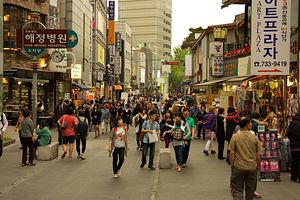“I am travelling the world. I need money to travel. Please help!!” A photo of a young foreign woman staring into the camera while holding cardboard with this message written in Korean has been making the rounds on the Korean news and around the internet. The woman is part of a new trend of begpackers, backpackers who take to the streets to beg for money to pay for their travels. These unorthodox beggars have started appearing in Seoul in greater numbers recently.
Raphael Rashid, dubbed the “begpacker buster” by the Korean news, has taken dozens of similar pictures of begpackers around Seoul, and has led the charge to publicize the practice in hopes of getting the authorities to crack down on those illegally begging in Korea. His photos, along with other pictures of begpackers asking for money to fund their travels around Asia, recently appeared on the front page of Reddit, garnering more than 60,000 upvotes and thousands of comments condemning the practice.
“Travel is a luxury available to only a privileged few. If you cannot afford to travel, don’t do it, let alone ask locals to pay for it,” Rashid wrote in a recent post about his crusade against South Korea’s begpacker community. The offenders he finds on the streets are largely white and from developed countries, setting up shop in some of Seoul’s poorest neighborhoods to gain sympathy from South Korea’s elderly population, Rashid writes. “When I asked people why they were donating money, the older folks told me it clearly wasn’t a scam, that they felt they needed to help her. That’s the thing: begpackers are not targeting you. They are targeting the most vulnerable, poorest sections of society.”
Begpacking is not a new phenomenon in Asia, but until recently it has largely been confined to more backpack-friendly countries in Southeast Asia. Backlash on social media and crackdowns by authorities have made begpacking in places like Indonesia and Hong Kong much harder in the last few years. To deter begpackers, Thailand recently started strictly enforcing a law that had been on the books but was loosely regulated, requiring anyone entering the country on a tourist visa to carry a minimum of 10,000 baht ($323). Perhaps these shifts – along with rising prices in South Korea – have driven the increase in these begpackers in Seoul.
Sometimes these travelers simply ask directly for money, often with the excuse that they lost their wallet or passport. But some sell art or trinkets, or busk on the street for tips. In those cases it makes it harder for authorities to crack down on perpetrators for begging – when confronted, they can simply pretend that they were just playing music on the street and can’t help it if people feel moved to donate. The fact remains, however, that it is still illegal to make money while in South Korea on a tourist visa, regardless of the means. Some local authorities have also pointed out that while they can ask for begpackers to leave certain areas, there may not be specific punishments on the books to help them deter perpetrators from simply moving elsewhere.
With the issue getting more public attention recently, though, begpackers may soon find that South Korea is no longer a friendly environment. Comments on recent Korean news articles about the phenomenon are overwhelmingly negative – “There are many homeless people who can’t even get a meal, what are you giving travel money for?” wrote one. “Don’t give them [money]. Because people keep giving, it’s like this,” wrote another. A recent video report from JTBC TV on the issue showed a Korean man confronting a begpacker on the street, yelling at him to go back to his home country. “If you don’t like it, just go,” the begpacker replied, then simply continued playing his guitar.
Jenna Gibson is a doctoral student in political science at the University of Chicago and a Korea blogger for The Diplomat. You can find her on Twitter at @jennargibson.

































